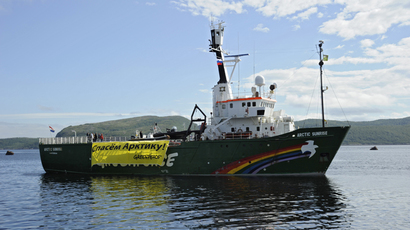Jailed Greenpeace activists delivered to St. Pete detention centers
The 30 jailed members of Greenpeace’s Arctic Sunrise have been transferred to a St. Petersburg pre-trial detention facilities from the northern Russian city of Murmansk, where they had been detained since September 18.
Security measures involving the transportation of the jailed
activists were stepped up. Greenpeace’s Arctic Sunrise members
arrived at the Ladozhsky train station at noon in a special wagon
which was promptly detached from the "Murmansk - St. Petersburg"
train and dragged to another platform. Family members and
journalists were not allowed to meet the detainees, who were
taken into custody and taken away in prison transport vehicles.
Transfer to St. Petersburg comes as charges of hooliganism
against 30 crewmembers "do not fall under the jurisdiction of
courts in the Murmansk region."
It will also make it easier for consular officials and families
to visit the crewmembers, who come from a total of 18 countries.
The 28 activists and two reporters were arrested on September 19
after an oil rig protest in the Barents Sea.
Head of the Human Rights Committee, Mikhail Fedotov, has called on the head of Russia's Investigative Committee, Aleksandr Bastrykin, to release the activists on bail on condition not to leave the country. Greenpeace head, Kumi Naidoo, has also offered to come to Russia and stand as security for the release of the detainees, but was refused.
The #Arctic is off limits - #FreeTheArctic30: @GreenpeaceNorge at the Arctic Oil and Gas Conference in Oslo. pic.twitter.com/EZ7fZ935iz
— Arctic Sunrise (@gp_sunrise) November 12, 2013
On November 6, the International Tribunal for the Law of the Sea
held a hearing in Germany into the Arctic Sunrise icebreaker and
its crew. The Netherlands demanded that all the activists, two of
whom are Dutch, be released.
The Dutch claim that Russian coast guards’ boarding of the Arctic
Sunrise was “internationally wrongful,” breaching the UN
Convention on the Law of the Sea and customary international law.
All subsequent acts – such as arrests and prolonged detention –
were therefore “wrongful” too, Dutch officials insist.
Russia, however, refused to take part in the tribunal, as it does
not have to participate in legal disputes that concern
“sovereign rights and jurisdiction.”
The Arctic Sunrise crewmembers attempted to scale Gazprom’s
Prirazlomnaya oil platform, Russia's first offshore oil rig in
the Arctic, in protest against the company's exploration
activities in the environmentally-sensitive Arctic.
Russian coast guards boarded the Arctic Sunrise and detained the
activists who were then placed in pre-trial detention in
Murmansk, a port city above the Arctic Circle, over 1,000
kilometers north of St. Petersburg.
Greenpeace activists and two reporters were detained till
November 24 and charged with piracy, which carries a maximum
penalty of 15 years in prison. However, Russia’s Investigative
Committee softened the charges to hooliganism, punishable with a
maximum penalty of 7 years.
Greenpeace claims that the piracy charges have not been formally
lifted, and anyway denies both accusations of piracy and
hooliganism. While the prosecution insists that the activists
“posed a real threat” to employees on the rig,
Greenpeace argues they did not create any kind of threat to the
safety of the platform’s personnel, as they carried nothing but
banners and ropes with them. Greenpeace also insists that the
Arctic Sunrise ship did not actually breach the 500-meter zone
around the platform, and has satellite data to prove it.














